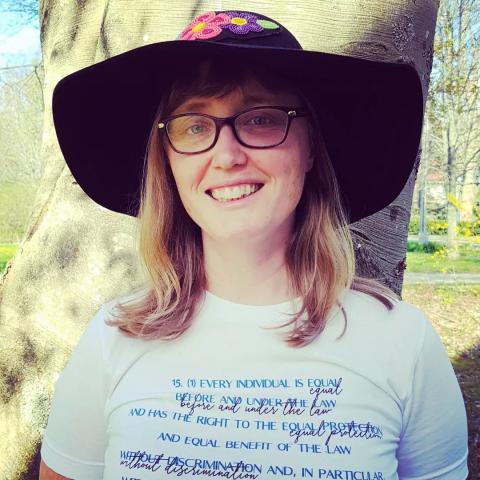Reclaiming my people’s teachings about time and relationships

Learning
In his essay “Advice to a Young Tradesman,” Benjamin Franklin wrote: “Time is Money.” To Franklin, time was an asset: a thing to be spent, saved, or used in the ultimate goal of becoming wealthy. The perception of time as a commodity and the teaching that inhabiting time well means always being productive (otherwise we are “wasting our time”) are still two of the most dominant teachings about time in North American culture today. But they are not the only teachings.
One of my favourite stories about how to inhabit time differently comes from Brenda MacDougall’s book One of the Family: Metis Culture in Nineteenth-Century Northwestern Saskatchewan.* MacDougall relates the story of a conflict between the English-born Chief Factor Joseph Fortescue and the Indigenous, Métis boatspeople of the community of Île à la Crosse.
The Beaver River route to Green Lake had finally thawed and was open for travel, so Fortescue paid workers to load the season’s first boats to be sent out of the district the next morning, not knowing that the following day was a Catholic holy day. He was surprised when, the next morning, the contracted Métis boatspeople told him they could not work because the day was holy. Despite this information, Fortescue insisted the boats leave for Green Lake at the scheduled time, but the Métis people refused. Instead, they left for the church worship service and quit work for the rest of the day. At midnight, however, when the holy day ended, they were there at the shore ready to depart.
The Métis boatspeople were not “lazy” or “unproductive”; in fact, they clearly took pride in their labour if they showed up at midnight to work! The Métis people simply did not hold an understanding of “time is money.” In the Métis worldview, what was most important was honouring the sacredness of the day and maintaining their relationship to all their relations, including those of the spirit world. There was a time for every matter under heaven—a time to work and a time to rest—and inhabiting time well meant responding appropriately to what the time truly called for.
As a Métis woman in the 21st century, I draw inspiration from this story in how to decolonize my relationship to time. It is one way I reject White Western capitalism and its discrimination against Indigenous and racialized peoples. The ancestors teach me that there are other ways to inhabit time other than urgently, as though time is a commodity of which there is never enough, that we can lose or gain or spend or save. They remind me that my self-worth is not tied to how much I produce but whether I have lived well in relation to others, including God and the Earth. And they remind me that the Métis have always practised a seasonal life—there are times for hard work, for rest, and for play.
As such, I try to adapt this “seasonal” rhythm into my life. I do not answer emails or texts on my days off. I intentionally make time for prayer every day. I work hard during the church’s busy seasons, and I let myself rest more during the slower seasons. And while it may seem small, actively practising this way of life is an act of decolonization. I am reclaiming my people’s teachings about time and relationships, and I am finding ways to practise these teachings in my context. I am learning to push back against the assumptions that there is only one way to measure time (by the hours of the clock), rather than by the phases of the moon or the ripening of berries. Slowly, I am learning that time is not money—time is a gift from God, and there is always more than enough of it, for there is time for every season under heaven.
Faith Reflection
Read Ecclesiastes 3:1‒15 and reflect on these questions:
- What time is it for you today? Is it time to work, play, dance, heal?
- How might you inhabit this time well—not necessarily “productively,” but in a manner that honours the time it is?
Your worth is not tied to your productivity; your worth already rests in the truth that you are a beautiful child of God. May you rest in this truth, too!
Living It Out
Practise setting appropriate boundaries and expectations in your work, home, and faith life. A decolonized relationship to time includes honouring the sacredness of rest for our bodies, minds, and spirits and finding other ways to inhabit time other than simply working (pun intended) under the assumption that “time is money.”
Further reading:
Tricia Hersey, Rest Is Resistance: A Manifesto (New York: Little, Brown Spark, 2022).
Kaitlin B. Curtice, Living Resistance: An Indigenous Vision for Seeking Wholeness Every Day (Grand Rapids, MI: Brazos Press).
—Penny Nelson (she/her) is a Métis woman originally from Camrose, Alberta, and an ordained minister in The United Church of Canada. She now lives in Wolfville, Nova Scotia, with her wife Nicole and their calico cat Minoosh. True to her rural upbringing, Penny still tries to grow, forage, and make as much of her own food as possible, and seeks ways to slow down and listen for Creator’s voice by listening to the land and its peoples.
*Vancouver: UBC Press, 2011, pp. 175‒178.
The views contained within these blogs are personal and do not necessarily reflect those of The United Church of Canada.